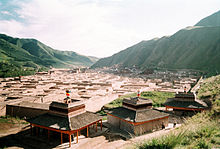
Back བླ་བྲང་དགོན། BO Labrang German Labrang monasterioa EU Monastère de Labrang French Labrang kolostor Hungarian Monastero di Labrang Italian ラプラン寺 Japanese 라브랑 사원 Korean Labrang (klooster) Dutch Labrang NB
| Labrang Monastery | |
|---|---|
Tibetan transcription(s) Tibetan: བླ་བྲང་བཀྲ་ཤིས་འཁྱིལ་ Wylie transliteration: bla brang bkra shis 'khyil Official transcription (China): 拉卜楞寺 THL: Labrang Trashi Khyil | |
 Overview of the Labrang Monastery | |
| Religion | |
| Affiliation | Tibetan Buddhism |
| Sect | Gelug |
| Festivals | January 4–17 June 26 – July 15 |
| Location | |
| Location | Gansu Province |
| Country | China |
| Geographic coordinates | 35°11′44″N 102°30′29″E / 35.19556°N 102.50806°E |
| Architecture | |
| Founder | Ngawang Tsondru |
| Date established | 1709 |
| Part of a series on |
| Tibetan Buddhism |
|---|
 |
Labrang Monastery (Tibetan: བླ་བྲང་བཀྲ་ཤིས་འཁྱིལ་, Wylie: bla-brang bkra-shis-'khyil; Chinese: Lābǔléng Sì, 拉卜楞寺) is one of the six great monasteries of the Gelug school of Tibetan Buddhism founded by Je Lama Tsongkhapa. Its formal name is Genden Shédrup Dargyé Trashi Gyésu khyilwé Ling (Tibetan: དགེ་ལྡན་བཤད་སྒྲུབ་དར་རྒྱས་བཀྲ་ཤིས་གྱས་སུ་འཁྱིལ་བའི་གླིང༌།, Wylie: dge ldan bshad sgrub dar rgyas bkra shis gyas su 'khyil ba'i gling).[1]
Labrang is located in Xiahe County, Gannan Tibetan Autonomous Prefecture, Gansu, in the traditional Tibetan area of Amdo. Labrang Monastery is home to the largest number of monks outside the Tibet Autonomous Region. Xiahe is about four hours by car from the provincial capital Lanzhou.
In the early part of the 20th century, Labrang was by far the largest and most influential monastery in Amdo. It is located on the Daxia River, a tributary of the Yellow River.[2]
